As we age, our bodies change, but does it mean we must give up on fitness?
In the past years, I’ve taken on quite a few clients in their 60s trying to get into shape, and while I welcome this, I’m always cautious when choosing exercises for their programs.
For people at this age, I gather information through consultations with doctors, dieticians and other medical professionals to provide the most appropriate workouts.
If you're over 60, find out how to transform your approach to exercise and why starting this journey could redefine your golden years.
Quick Summary
- Bodyweight workouts, resistance band exercises, and moderate weight training using lateral machines are appropriate workouts for men in their 60s.
- The benefits of exercising for seniors include the prevention of diseases, self-reliance in old age, and improved physical and mental health.
- Regular exercises, adequate sleep, and nutrition which include some high-quality supplements, all make muscle maintenance easier for men over 60.
- I've witnessed the transformative power of fitness in the lives of not just men but women in their 60s and that reaffirms that our potential for strength and vitality is limitless, regardless of age.
Best Exercise for Men Over 60
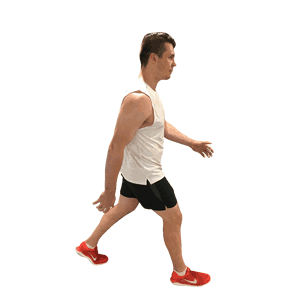
Here are some of the most effective exercises for 60-year-old men.
1. Walking
Walking as a cardiovascular exercise is one of the least stressful forms of exercise for seniors.
It has multiple benefits for seniors, including the strengthening of muscles and bones, improving balance and coordination, promoting flexible joints, and reducing anxiety and depression, among other benefits.
I've trained many seniors approaching their 70s and they always report enhanced mood, mental alertness, and mental well-being after taking long walks.
 2. Bodyweight Workouts
2. Bodyweight Workouts
Body weight exercises are among the most effective ways to combat the loss of muscle mass in older adults.
According to WebMD, there are two main reasons for increased muscle mass loss for men in their 60s; a decreased ability to metabolize protein and hormonal problems [1].
As a fitness trainer, I always recommend combining bodyweight exercises with a balanced diet that includes adequate proteins, vitamins, and minerals. Proteins are especially vital for men in their 60s.
What's more? Foods rich in antioxidants and omega-3 fatty acids can aid in muscle recovery after workouts. They are also good for cognitive function.
Recommended bodyweight workouts for senior adults in their 60s include:
- Superman Exercises
- Leg Lifts
- Planks
- Wall Push-ups
- Squats to Chair
3. Resistance Band Workouts
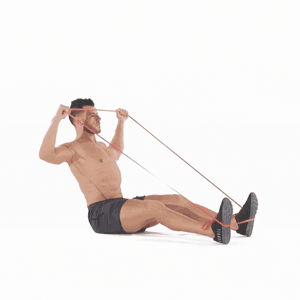
Resistance bands add some resistance to workouts and reduce stress on the body.
They make difficult workouts easier to do and thus can be useful to seniors during workouts. Check out our full guide on resistance band circuit workouts.
Their cheap upfront costs make them ideal for home use. Examples of exercises to do with resistance bands include:
- Chest Pull
- Band Pull-apart
- Lateral Raise
- Squats
- Leg Press
- Tricep Press
- Bicep Curl
- Pull-ups
 4. Dumbbell Strength Training
4. Dumbbell Strength Training
According to research published in the National Library of Medicine, weightlifting can alleviate symptoms of osteoporosis, diabetes, depression, and back pain [2].
But more importantly, they also help you lose weight.
From my experience working with seniors, I've also found that they help enhance your metabolism long-term.
The use of small-weight dumbbells for strength training allows you to strengthen muscles while also improving your flexibility and balance.
Examples of dumbbell workouts that you can add to your exercise program include:
- Overhead Press
- Dumbbell Bench Press
- Tricep Extension
- Bent-over Row
- Front Raise
 5. Workouts with Lateral Machines
5. Workouts with Lateral Machines
I prefer to train my older clients with lateral machines because they are generally safer to use as there is less likelihood of injury.
The fact that they can also be fine-tuned for the smallest weight increments makes it possible for seniors to add on small weights.
This makes them ideal for people in their 60s.
What Is a Good Workout for a 60-Year-Old Man?

A good workout for a 60-year-old man is one that helps improve balance, agility, stability, strength, and mobility.
It's not just about fitness; these things help seniors in their daily functioning and lower the risk of falls and cardiovascular diseases.
Examples of great workouts for older adults include bodyweight exercises, moderate weight training, and cardiovascular exercises. I've seen firsthand how these workouts transform the lives of men in their 60s.
Combating Muscle Loss
At 60, the enemy is muscle loss. That's because adults are more likely to lose muscle mass as they get older, as per studies by the National Institute of Health [3].
But this doesn’t mean it's impossible to gain muscle at this age. You can still gain lean muscle mass by weight training.
I've personally helped many men well into their 60s build significant muscle mass and strength. Of course, it wasn't easy, but with consistent effort and determination, they were able to reach their goals.
"By strength training at least two days per week to your exercise routine, you can avoid loss of muscle, and thus stay independent longer by maintaining your strength and balance."
- Valerie Hurst, FAI-Certified Trainer
But in order to build muscle at this age, your workout routine needs to be planned to reflect the following:
- More recovery time - Studies published on ResearchGare suggest that older adults need more recovery time than their younger counterparts [4].
- Consider your choice of workouts - While isolation exercises such as biceps curls are still beneficial, compound exercises are more effective and less time-consuming. Additionally, they activate more muscle groups simultaneously.
Of course, all these workouts should be performed in a safe manner to avoid injuries.
That’s why we recommend assisted workouts using tools such as resistance bands, especially when doing compound exercises.
Now, if you’re new to this, you should first strive to learn proper exercise techniques for muscle memory.
Health Benefits of Exercise for Seniors

The benefits of physical exercise for people of any age cannot be overemphasized. However, the perks might be even more notable among seniors.
Below are the benefits of working out at this age.
More Independence
Healthy and physically active seniors are less likely to depend on caretakers.
Researchers from Harvard Medical assert that regular exercise enhances the ability of seniors to bathe, eat, cook, dress, and use the restroom independently [5].
Disease Prevention and Counteraction
Diseases such as diabetes, depression, heart disease, and osteoporosis are common among the aged population.
But the good thing is that they can be prevented by living an active lifestyle.
If you’re already diagnosed, exercise might be able to alleviate the symptoms of these conditions.
Being part of a community that shares fitness goals and achievements can also play a crucial role in preventing and treating these diseases.
I like letting seniors work out together. That way, I encourage social interactions among them. It boosts their mental health and makes their workouts more enjoyable.
Improved Balance
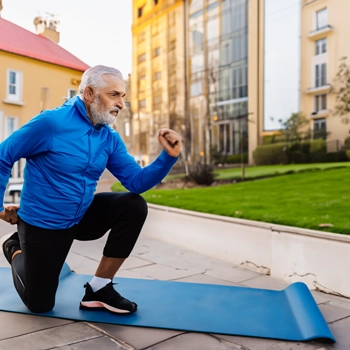
Statistics as shown by the CDC show that that in every second, an older adult of age 65 and above falls. It is one of the leading causes of injuries and death in this age group [6].
However, according to research by Cochrane, exercise can reduce the rate of falls among the elderly by up to 23% [7].
Improved Brain Function
Research found in the National Library of Medicine asserts that a healthy body often means a healthy mind and that seniors who work out regularly have improved cognitive function [8].
Additional studies by the Alzheimer's Association also show that regular exercise reduces the likelihood of developing Alzheimer’s and dementia [9].
FAQs
How Often Should a 60-Year-Old Male Lift Weights?
A 60-year-old male should lift weights at least 2-3 times a week. A two-minute rest is recommended if one is using resistance training equipment.
What Exercises Should Be Avoided After 60?
Exercises that should be avoided at 60 include sprints, deep squats, squats with weights, high-impact aerobics, and stair climbs. These workouts can cause seniors to injure their joints and strain their cardiovascular systems.
Should a 60-Year-Old Man Workout Everyday?
Yes, a 60-year-old man should consider moderate-intensity workouts every day or at least 150 minutes a week for five days.
Combine a Protein Powder with Regular Workouts
The goal of a 60-year-old man should be to maintain muscle. And staying active by taking regular walks, doing moderate cardio, and lifting weights can help you in this regard.
While strength training, sleep, and a balanced diet can help you maintain muscle, combining this with a protein powder supplement makes it much easier.
We’ve thoroughly tested the supplements on these lists, and all of our test data shows they are very effective in helping muscle maintenance.
References:
- https://www.webmd.com/healthy-aging/sarcopenia-with-aging
- https://www.ncbi.nlm.nih.gov/pmc/articles/PMC6279907/
- https://www.ncbi.nlm.nih.gov/pmc/articles/PMC2804956/
- https://www.researchgate.net/publication/273062725_Prolonged_recovery_to_a_single_session_of_high-intensity_interval_training_in_older_men
- https://www.health.harvard.edu/blog/walking-exercise-helps-seniors-stay-mobile-independent-201405287173
- https://www.cdc.gov/injury/features/older-adult-falls/index.html
- https://www.cochranelibrary.com/cdsr/doi/10.1002/14651858.CD012424.pub2/full
- https://www.ncbi.nlm.nih.gov/pmc/articles/PMC3951958/
- https://www.alz.org/alzheimers-dementia/research_progress/prevention
About The Author
You May Also Like

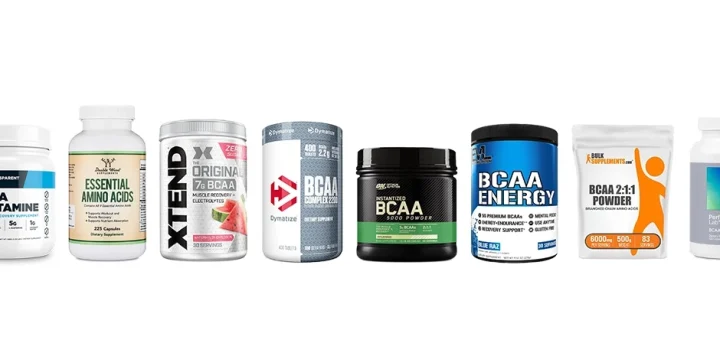



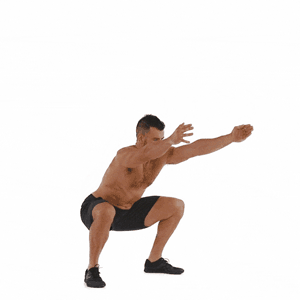 2. Bodyweight Workouts
2. Bodyweight Workouts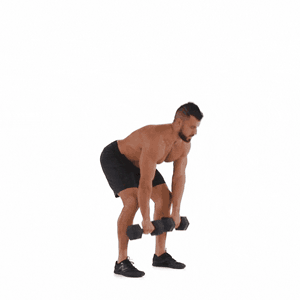 4. Dumbbell Strength Training
4. Dumbbell Strength Training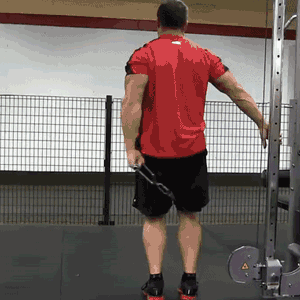 5. Workouts with Lateral Machines
5. Workouts with Lateral Machines

Walking is seriously underrated. I’ve been doing it for a while now, and I love that it helps with muscle and bone strength.
I like that it includes tips on recovery too. At this age, rest days matter just as much as the workouts themselves.
The routines here are actually doable, not some extreme stuff you’d see for 20-year-olds. Strength and balance really do get more important with age.
Glad this focuses on mobility and joint-friendly moves. At 62, I’m not trying to max out deadlifts anymore—just want to stay active and pain-free.